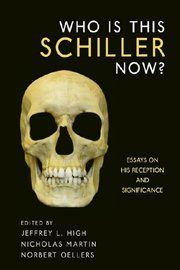Book contents
- Frontmatter
- Contents
- Foreword
- Acknowledgments
- List of Abbreviations
- Introduction: Why Is This Schiller [Still] in the United States?
- Part I Schiller, Drama, and Poetry
- 1 Lenz und Schiller. Die erlebnissymptomatische Dramensprache
- 2 Melancholy in Schiller's Dramas
- 3 Schillers Ästhetik der Trauer. Der Dichter als “elegischer” Lyriker und Dramatiker
- 4 Glühendes Wort zum Ideal über der versagenden Realität — zu Schillers Balladen
- 5 Zwischen Max Piccolomini und Buttler. Wallensteins Orts- und Zeitverluste
- Part II Schiller, Aesthetics, and Philosophy
- Part III Schiller, History, and Politics
- Part IV Schiller Reception — Reception and Schiller
- Part V Schiller Now
- Notes on the Contributors
- Index
4 - Glühendes Wort zum Ideal über der versagenden Realität — zu Schillers Balladen
from Part I - Schiller, Drama, and Poetry
Published online by Cambridge University Press: 05 February 2013
- Frontmatter
- Contents
- Foreword
- Acknowledgments
- List of Abbreviations
- Introduction: Why Is This Schiller [Still] in the United States?
- Part I Schiller, Drama, and Poetry
- 1 Lenz und Schiller. Die erlebnissymptomatische Dramensprache
- 2 Melancholy in Schiller's Dramas
- 3 Schillers Ästhetik der Trauer. Der Dichter als “elegischer” Lyriker und Dramatiker
- 4 Glühendes Wort zum Ideal über der versagenden Realität — zu Schillers Balladen
- 5 Zwischen Max Piccolomini und Buttler. Wallensteins Orts- und Zeitverluste
- Part II Schiller, Aesthetics, and Philosophy
- Part III Schiller, History, and Politics
- Part IV Schiller Reception — Reception and Schiller
- Part V Schiller Now
- Notes on the Contributors
- Index
Summary
As an enlightened author and poet, Friedrich Schiller declared in his Aesthetic Letters that ethics could best be taught via aesthetic insights. This implied that the depiction of violent crime and other vices was necessarily delivered in the elevated language of poetry, a proposition that came to fruition in the ballads written during the last decade of his rather short life. Whereas his prose is of no lesser eloquence and mastery, it remains more realistic than his poetry, which is rich in metaphors, idioms, and a variety of poetic devices matched only by his contemporaries and friends, Goethe and Hölderlin. This essay sheds light on the particular strength of Schiller's ballads, and represents an attempt to explain why they have been absent from the curriculum of recent decades both in the German-speaking countries and even more so in those where German is taught as a foreign language. At the same time it suggests ways in which the ballads could be reintroduced with a different approach and attitude.
DIE ETWAS ÜBERTRIEBEN WIRKENDE Formulierung des Themas will auf eine durchgängige Auffassung der theoretischen Kritik von Schillers Epik der Balladen bauen, die das sprachliche Kunstwerk dieses besonders in den siebziger und achtziger Jahren des 20. Jahrhunderts im allgemeinen Schulunterricht vernachlässigten Dichters wieder in den Vordergrund der Lehre rückt.
- Type
- Chapter
- Information
- Who Is This Schiller Now?Essays on his Reception and Significance, pp. 69 - 80Publisher: Boydell & BrewerPrint publication year: 2011



